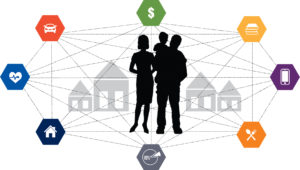Inequality in the Cradle of Revolution
Capitalist societies are, by their nature, not equal. And in fairness, that is arguably a good thing. The ability for individuals to have the incentive to build wealth is what drives innovation and fuels work beyond the need for sustenance. The issue that arises in capitalist societies is not the existence of inequality; it’s the degree of inequality. 50% of the wealth is held by 70% of the people, the other 30% while better off, are not that much better off on average. Meanwhile, if 99% of the wealth is held by 1% of that society’s members, that is typically seen as a major problem. But before you start calling for taxing the 1%, you might want to stop for a moment, you might just be one of them.

On the whole, when speaking on a global scale, Canada is not a country that suffers from extreme inequality. In fact, based on the Gini Coefficient, the metric that measures inequality within a country, Canada is the 52nd least unequal country in the world out of 159 countries on the survey scoring a 0.34 vs the 0.634 of the least equal country on the survey, South Africa. Overall we are above average, but this does hide a few serious issues.
Let’s first consider income inequality. Statistics Canada has found that the:
- The 1% household income in Canada earns $306,710
- The 5% household income in Canada earns $157,486
- The 25% household income in Canada earns $78,820
- The 50% household income in Canada earns $44,807
- The 75% in Canada earns $21,811
But let me put that into context:
- The median household income in the GTA is approximate $78,000, which means that 50% of all GTA households are in the top 25% of all Canadian income-earning households.
- Someone in the skilled trades married to a teacher would earn a combined household income that would put them in the top 5% of households in Canada
- 25% of Canadian households earn less than $21,811/year
The point is that relatively speaking, the average GTA household and a married couple in the examples, on the upper end of incomes in Canada. Meanwhile, the lowest income is frighteningly low. That said, income often hides the true picture, to truly understand inequality, we need to consider wealth. Here again, we can turn to Statistics Canada who states that:
- The top 1% of net worth in Canada in 2021 = $9,737,000
- The top 2% of net worth in Canada in 2021 = $2,500,000
- The top 5% of net worth in Canada in 2021 = $980,000
- The top 10% of net worth in Canada in 2021 = $840,000
- The top 50% of net worth in Canada in 2021 = $482,000
That means the average family living in Toronto with their home paid off is likely in the top 2-5% of net worth in Canada. So overall if you are living in the GTA, you are either feeling good about yourself right now or denying this and saying that despite that you are not wealthy. Well relatively speaking, the average household is. But again, this does not tell the full story.
When we look at wealth across generations, inequality becomes staggering. It is estimated that Millenials, people born from 1981-1996, control less than 3% of the nation’s wealth. The issue is that at the same life stage, the Boomer generation was estimated to control almost 20% of the nation’s wealth. The most educated generation of Canadians, who came of age in the world of the internet and computers, a world that was supposed to hold boundless opportunity, and managed to obtain under one-seventh of the wealth of their parent’s generation. So why does this matter? It matters because no one of us is an island. We are all a part of the Canadian society, and in order for all of us to live the lives we want, “wealthy” or not, we need Canadian society to function. There are significant costs to imbalance.
Illness and crime are more prevalent in lower-income communities raising the cost of enforcement, social services, and health care.
Educated young people with highly portable skills may want to stay close to home, but boxed out of the housing market, many are discovering that they are better off leaving for places like Calgary, or Canada in general. When that happens, our future tax base erodes leaving older generations to foot the bill. A country’s future is as bright as the opportunity it affords its people and right now for millennials, it’s looking bleak and those that are staying aren’t content with the status quo.
Discussions of wealth taxes and universal basic income are becoming normal in political circles. And no, this is not due to a single party or politician’s belief system, it’s because politicians understand one thing above all else: votes. Millennials will in the next few years become the largest demographic voting block. Couple them with non-millennials at the lower end of the income and wealth spectrum, and you have a lot of voters that are highly incentivized to see changes to tax and social support systems.
The reality is that when people believe that society has stopped working in their best interest, they fight back. In most countries around the world, and throughout history, we see severe inequality lead to revolution. Prolonged inequality leads to ongoing instability as we see in countless developing nations.
In modern western societies, it leads to political winds of change. The only way to prevent it is to concern ourselves with a society more with equality at all times
What will that lead to, probably a more equal society from an income and wealth standpoint. But likely an overhaul of our tax code. One that focuses less on taxing labour income to allow for the creation of wealth, and more on taxing assets like real estate and investment returns (the wealth you have built).
And before you say to yourself, forget that I will just leave Canada, remember that there are taxes on exit as well. In nature, all high-pressure systems push into low-pressure systems. Nature does not permit imbalances, and while humans do, they do to a point.
Manuel Luis/MS








Redes Sociais - Comentários